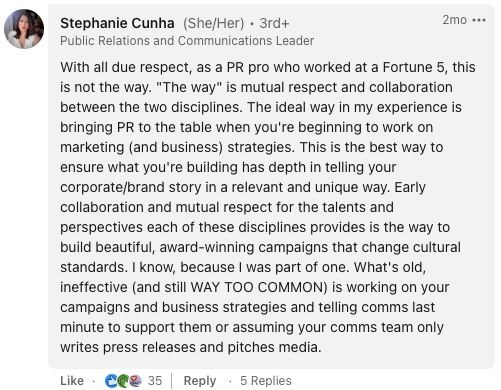Welcome to the 22 people who subscribed to this newsletter in the last 30 days. I appreciate you spending time with us! 👋
It’s been months since my last newsletter. I wanted to wait until a trending item rocked the PR industry — at least that’s what I’m telling my guilty self. The truth is I got married in the Spring and bought a house in the Summer! Our adventure-chasing spirits took us to faraway scenic places and loved ones. But we do have a raging hot topic, despite the fact that it is an old matter.
Who Does PR Report To Today?
Recently, PR and marketing pros have been exchanging views on LinkedIn, Twitter, and even YouTube. Heads turned and people sermonized because of a semi-contrarian take: Marketing should report to PR / Comms. Parry at Crackle reignited this convo, and it led to insightful fiery opinions and critiques of PR in general.
Who PR or Marketing should report to is not a fresh topic. Ten years ago, the CEO of global comms agency Ketchum said to Ad Age, “You are going to start seeing decisions about whether marketing should report to PR.” Then there’s this three-year-old piece from PR veteran and widely read blogger Frank Strong.
This debate has seen zero movement. Marketing will never report to PR because of the PR industry's inability to articulate what it delivers today and the fact that the majority of PR professionals lack a significant understanding of business.
The evergrowing responsibilities and capabilities of comms professionals are not widely known. What’s more, the vast majority of PR agencies or consultants only provide media relations, and that’s okay. Buuuuut, unless a marketer meets and works with a comms professional who builds a corporate narrative or knocks out positioning work, how could they ever know what PR and comms pros can do for them?
Why then has this take been making the rounds online? I have four reasons:
Going against the grain in PR always sparks attention
There are countless hard-headed PR pros out there
PR is misunderstood, so why would marketers report to a group they don’t ‘get’
Business storytelling involves more strategy than before
What I Am Seeing
I can count 13 CEOs at B2B tech companies I've worked with in the past five and a half years who chose to be my point of contact (POC) even though they had a VP of Marketing or CMO. I reported to them. This is a dream for me because, without any filters or hearsay, I hear their observations on the market, know what they want from me, can set expectations, and have direct access to a subject matter expert.
These CEOs may have known things like:
Their CMO hadn't led a comms or PR team 🪄
Their CMO was unable to successfully wrangle subject matter experts ✍️
Their CMO wasn't experienced with narrative creation 📖
Their CMO was an executioner, not strategic 🔪
Their CMO was on their way out 🚪
Let Comms Pros Know The CEO
No one I know disputes that a company's CEO is its primary storyteller. Of course, whether that is good or detrimental depends on the individual and their education — or lack thereof. Since crafting and communicating messages are a good chunk of what PR is all about, and it’s a core function of marketing, wise CEOs know they must participate in PR programs.
PR pros must have unrestricted access to the CEO, whether they report to Marketing or a CEO. When a CEO doesn’t work with a PR partner or decides to regularly decline meetings with them (argh!), the end of that key relationship is often near as all sorts of preventable problems take shape such as…
Announcements go out that a CEO wants to yank back
The CMO or PR team gets scolded for writing quotes that don’t fit the voice of the CEO (how could they do it if they don’t know them?)
Side note: I’ve known marketing leads who purposely did not inform a CEO what we were working on because they might get a ‘no’. By the way, I don’t accept this anymore.
A tight relationship between PR and CEOs is what matters most. Great CEOs know which stories resonate with staff, prospective customers, job applicants, reporters, analysts, partners, and investors because they’re testing and refining them. Yet, this does not mean they are the ones usually responsible for developing the compelling stories that employees tell their peers at conferences or job fairs. On the contrary. The bulk of seasoned and modest CEOs will admit that they lack this skill, and rely on strategic comms pros.
Take it from me. If there's a hot debate in PR on LinkedIn, the topic has already been discussed elsewhere for a very, very long time.









